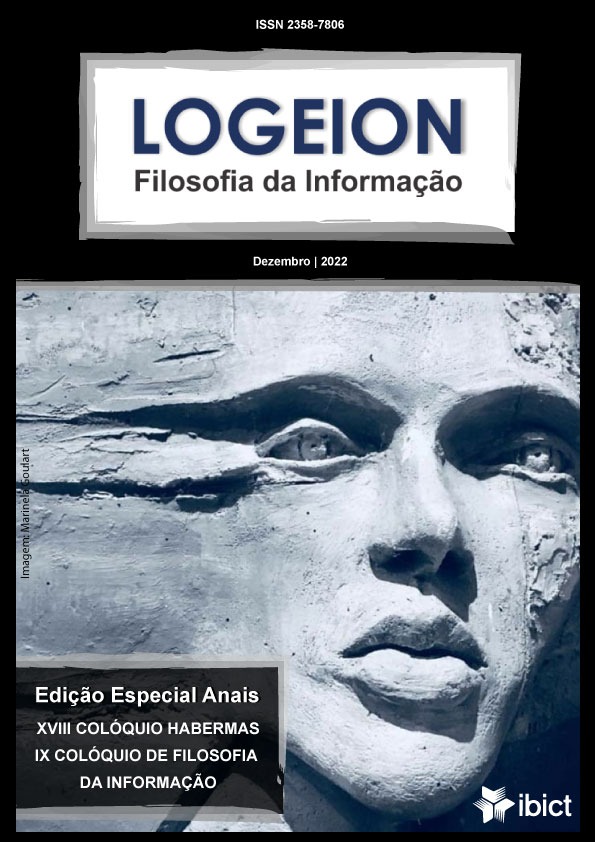Effectiveness of participation parity as a requirement for an equal public sphere
DOI:
https://doi.org/10.21728/logeion.2022v9nesp.p60-74Keywords:
Esfera Pública. Paridade de Participação. DemocraciaAbstract
Parity of justice is the normative paradigm in Nancy Fraser's theory of justice, which proposes the overcoming of the classical distinction between the spheres of redistribution and recognition, concludind that none of the central spheres, when isolated, can be sufficient for an effective social justice. In this context, the author advocate that the demandas need both: economic remedies as well as cultural-evaluative remedies. Despite the great influence of the concept of public sphere formulated by Habermas on the author's theory, Fraser also exposes criticisms, as she understands that the Harbermasian model does not effect the parity of those involved, insofar as it is not concerned with remedying social inequalities, but only in suspending them in the public environment, failing in evaluating the impacts of this in the deliberation. Another important factor, according to the author, are gender issues, as well as the problematic distinction between public and private, which is one of the current feminist movement demands. Therefore, the present work aims to proceed with an analysis of Habermas’ public sphere in Fraser’s view, which problematizes some assumptions that sustain the liberal model, instigating a reformulation. In order to move towards an alternative and post-bourgeois public sphere conception, the theory aims to guarantee not only the formal and legal authorization for participation, but also the guarantee of the material essential requirements that are required for the parity participation.
Downloads
References
ARRUZZA, Cinzia; BHATTACHARYA, Tithi; FRASER, Nancy. Feminismo para os 99%: um manifesto. Tradução: CANDIANI, Heci Regina. São Paulo: Boitempo, 2019.
BIROLI, Flávia. Teorias feministas da política, empiria e normatividade. In: Lua Nova, São Paulo, 102: 173-210, 2017.
COLLINS, Patricia Hill; BILGE, Sirma.Interseccionalidade.São Paulo: Boitempo, 2021.
FELDHAUS, Charles; PEREIRA, Camila Dutra. Diálogos entre a teoria social crítica habermasiana e a teoria feminista de nancy fraser. Disponíevel em: http://orcid.org/0000-0002-1004-8249. Acesso em: 05 set. 2022.
FRASER, Nancy. O velho está morrendo e o novo não pode nascer. São Paulo: Autonomia Literária, 2021.
FRASER, Nancy. Struggle over Needs:outline of a socialist feminist critical theory of late capitalism political culture. Minneapolis: University of Minesota Press, 1989.
FRASER, Nancy. Repensar el ámbito público: una contribuición a la crítica de la democracia realmente existente. In: Debate feminista, marzo de 1993.
FRASER, Nancy. Justiça interrompida: reflexões sobre a condição “pós-socialista”. São Paulo: Boitempo, 2022.
FRASER, Nancy; HONNETH, Axel.Redistribution or recognition?A political-philosophical exchange. New York: Verso Books, 2003.
PIROLI, Diana. Justiça e reconhecimento: uma interpretação das bases sociais do autorrespeito de John Rawls a partir do debate redistribuição e reconhecimento. Tese de doutorado. Florianópolis: UFSC. 2021.
SANTOS, Barbara Cristina Soares. Paridade de participação e emancipação em Nancy Fraser: reconhecimento e justiça a partir do feminismo. Dissertação de Mestrado. Faculdade de Filosofia, Letras e Ciências Humanas na Universidade de São Paulo. São Paulo, 2020.
SOUZA, Luiz Gustavo da Cunha. Reconhecimento, redistribuição e as limitações da teoria crítica contemporânea.Tese de Doutorado. Campinas: Unicamp. 2013.
UZUN, Julia Rany Campos. Roteiros do sagrado: conhecendo as religiões ao redor do mundo. Joinville: Clube de Autores, 2021.
Downloads
Published
Issue
Section
License
Copyright (c) 2023 Logeion: Filosofia da Informação

This work is licensed under a Creative Commons Attribution-NonCommercial-ShareAlike 4.0 International License.
The journal is published under the Creative Commons - Attribution - Noncommercial - Share Alike 3.0 Brazil.
The published work is considered collaboration and therefore the author will not receive any remuneration for this as well as anything will be charged in exchange for publication.
All texts are responsibility of the authors.
It’s allowed partial or total reproduction of the texts of the magazine since the source is cited.




